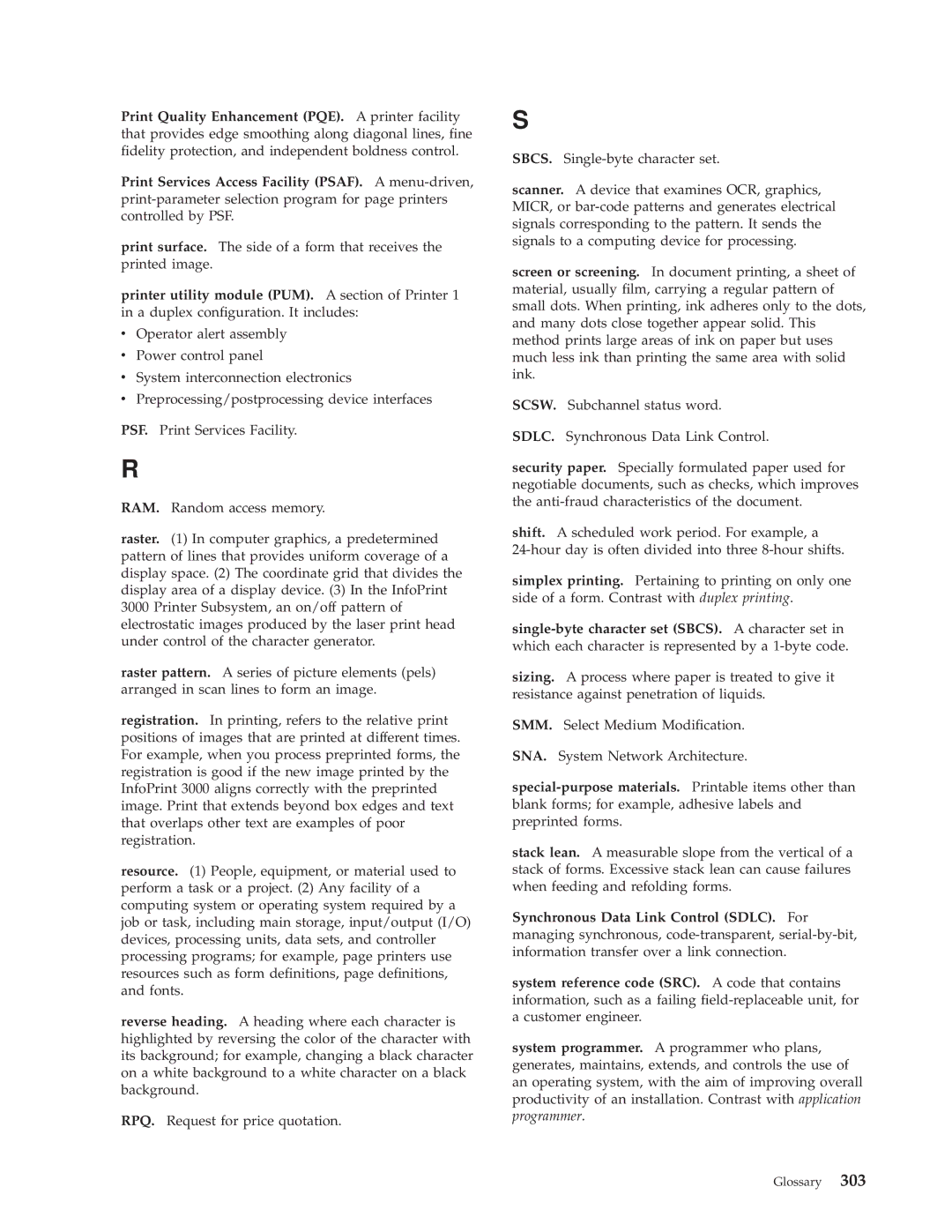Print Quality Enhancement (PQE). A printer facility that provides edge smoothing along diagonal lines, ®ne ®delity protection, and independent boldness control.
Print Services Access Facility (PSAF). A
print surface. The side of a form that receives the printed image.
printer utility module (PUM). A section of Printer 1 in a duplex con®guration. It includes:
vOperator alert assembly
vPower control panel
vSystem interconnection electronics
vPreprocessing/postprocessing device interfaces
PSF. Print Services Facility.
R
RAM. Random access memory.
raster. (1) In computer graphics, a predetermined pattern of lines that provides uniform coverage of a display space. (2) The coordinate grid that divides the display area of a display device. (3) In the InfoPrint 3000 Printer Subsystem, an on/off pattern of electrostatic images produced by the laser print head under control of the character generator.
raster pattern. A series of picture elements (pels) arranged in scan lines to form an image.
registration. In printing, refers to the relative print positions of images that are printed at different times. For example, when you process preprinted forms, the registration is good if the new image printed by the InfoPrint 3000 aligns correctly with the preprinted image. Print that extends beyond box edges and text that overlaps other text are examples of poor registration.
resource. (1) People, equipment, or material used to perform a task or a project. (2) Any facility of a computing system or operating system required by a job or task, including main storage, input/output (I/O) devices, processing units, data sets, and controller processing programs; for example, page printers use resources such as form de®nitions, page de®nitions, and fonts.
reverse heading. A heading where each character is highlighted by reversing the color of the character with its background; for example, changing a black character on a white background to a white character on a black background.
RPQ. Request for price quotation.
S
SBCS.
scanner. A device that examines OCR, graphics, MICR, or
screen or screening. In document printing, a sheet of material, usually ®lm, carrying a regular pattern of small dots. When printing, ink adheres only to the dots, and many dots close together appear solid. This method prints large areas of ink on paper but uses much less ink than printing the same area with solid ink.
SCSW. Subchannel status word.
SDLC. Synchronous Data Link Control.
security paper. Specially formulated paper used for negotiable documents, such as checks, which improves the
shift. A scheduled work period. For example, a
simplex printing. Pertaining to printing on only one side of a form. Contrast with duplex printing.
sizing. A process where paper is treated to give it resistance against penetration of liquids.
SMM. Select Medium Modi®cation.
SNA. System Network Architecture.
stack lean. A measurable slope from the vertical of a stack of forms. Excessive stack lean can cause failures when feeding and refolding forms.
Synchronous Data Link Control (SDLC). For managing synchronous,
system reference code (SRC). A code that contains information, such as a failing
system programmer. A programmer who plans, generates, maintains, extends, and controls the use of an operating system, with the aim of improving overall productivity of an installation. Contrast with application programmer.
